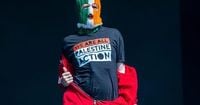On July 24, 2025, Hungary took the unprecedented step of banning the Irish rap group Kneecap from entering the country ahead of their scheduled performance at the renowned Sziget Festival in Budapest, set for August 11. The government cited national security concerns, pointing to the band’s alleged use of antisemitic hate speech and their supposed praise for militant groups Hamas and Hezbollah as the primary reasons for the ban.
Kneecap, a Belfast-based trio known for their anarchic energy, satirical lyrics, and use of Irish republican symbolism, has long courted controversy. Their politically charged performances often include outspoken criticism of Israel, especially regarding its military actions in Gaza, which has sparked backlash in several countries. The band vehemently denies supporting Hamas or Hezbollah or condoning violence, maintaining that their activism champions love and solidarity while calling out injustices.
The ban was formalized by Hungary’s National Directorate-General for Aliens Policing, which issued decrees barring members Naoise Ó Cairealláin, J.J. Ó Dochartaigh, and Liam Óg ÓhAnnaidh from entering Hungary for three years. Government spokesperson Zoltán Kovács explained on the social media platform X that the decision was due to the group’s history of “antisemitic hate speech and open praise for Hamas and Hezbollah,” emphasizing Hungary’s “zero tolerance” policy toward antisemitism. Kovács warned that allowing Kneecap to perform would normalize hate and terror, jeopardizing democratic values and national security.
Hungary’s Minister for European Union Affairs, János Bóka, had previously sent a letter to Sziget Festival organizers on July 11 underscoring the government’s firm stance against antisemitism. This move was supported by hundreds of Hungary’s music and cultural community members, who signed a petition urging the festival to cancel the band’s performance.
The Sziget Festival organizers responded by calling the ban “unnecessary and regrettable,” warning that it might damage both the festival’s reputation and Hungary’s standing on the global stage. They stressed their commitment to condemning hate speech while upholding artistic freedom of expression, arguing that “cancel culture and cultural boycotts are not the solution.” The festival, one of Europe’s largest, also features artists like Post Malone, Shawn Mendes, and Charli XCX this year.
Kneecap has faced similar challenges elsewhere. Their April 2025 performance at the Coachella Valley Music and Arts Festival in California ignited controversy after displaying messages such as “F*** Israel, Free Palestine” and accusing Israel of genocide. These displays led to calls for revoking their U.S. visas and cancellations of subsequent gigs, including at major German festivals and the Eden Project and TRNSMT festivals in the UK. Their U.S. booking agency dropped them following the backlash.
Further complicating their situation, Liam Óg ÓhAnnaidh, the band’s frontman known as Mo Chara, was charged under the United Kingdom’s Anti-Terrorism Act after a video surfaced of him displaying a Hezbollah flag and chanting “Up Hamas, up Hezbollah” during a 2024 concert in London. While ÓhAnnaidh denies the charges and pledges to defend himself, the case has added fuel to the fire, intensifying calls for Kneecap’s exclusion from festivals and tours.
In June 2025, at the Glastonbury Festival, ÓhAnnaidh accused Israel of war crimes and led chants of “Free, free, Palestine,” further polarizing opinions about the band. Their political messaging has drawn sharp criticism from various quarters, including indigenous leaders in Canada, who in July urged the cancellation of Kneecap’s scheduled October concerts, labeling the band’s rhetoric as supportive of antisemitism and genocide.
Hungary’s decision to ban Kneecap aligns with its broader political stance. The Hungarian government, led by Prime Minister Viktor Orbán, has been a vocal supporter of Israel amid growing European criticism of the Jewish state’s military actions in Gaza. In April 2025, Hungary’s parliament voted to withdraw from the International Criminal Court, citing what it called the court’s politically motivated stance against Israel following the October 7, 2023, Hamas terrorist attacks.
Kneecap, for their part, condemned the ban as politically motivated and an infringement on artistic freedom. In a statement on X, they criticized Orbán’s government as “authoritarian” and accused it of hypocrisy for welcoming Israeli Prime Minister Benjamin Netanyahu in April despite the latter facing an ICC arrest warrant. They insisted no member of the band had ever been convicted of any crime and denied any legal basis for the ban.
The band’s turbulent journey highlights the complex intersection of art, politics, and international relations. Their outspoken support for Palestinian rights and criticism of Israeli policies have made them a lightning rod for controversy, raising difficult questions about freedom of expression, antisemitism, and the limits of political dissent in cultural spaces.
As Kneecap faces bans and cancellations across multiple countries, including Hungary, the United States, Germany, France, and Canada, the debate over their music and message continues to unfold on a global stage. Whether their exclusion from Hungary’s Sziget Festival will set a precedent for other nations remains to be seen, but it undeniably marks a significant moment in the ongoing cultural and political battles surrounding the Israeli-Palestinian conflict.





